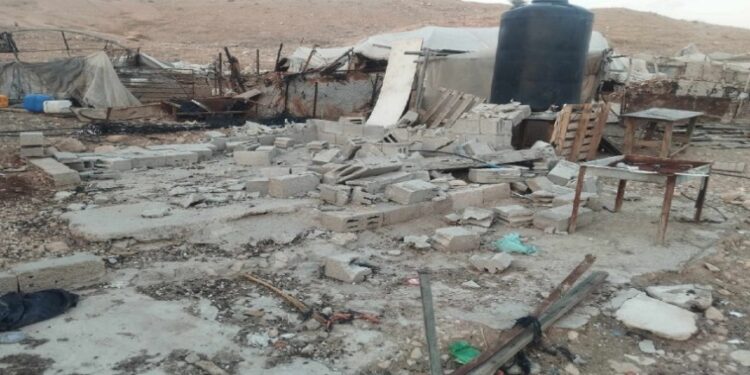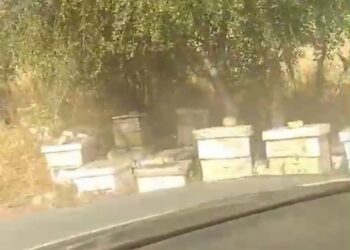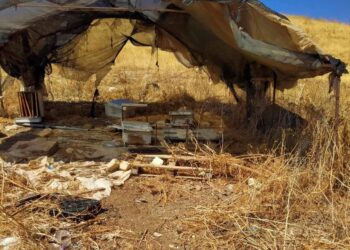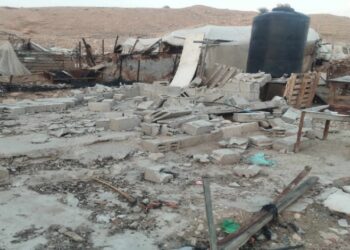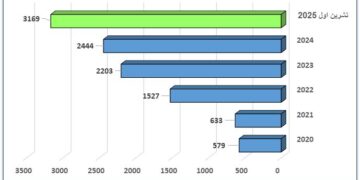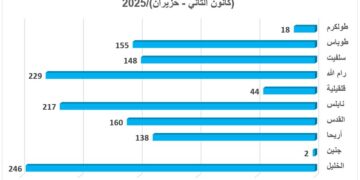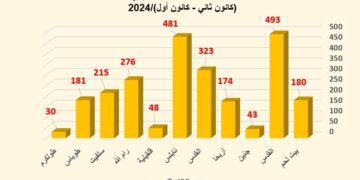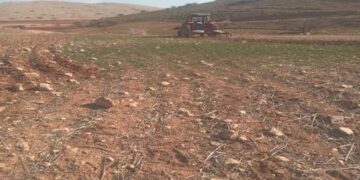Introduction
Ein al-Beida, located in the northern Jordan Valley, to the northeast of Tubas Governorate, is a Palestinian village deeply affected by escalating settler violence and the Israeli Civil Administration (ICA) policies. The family of Mrs. Ferial Talal Yousef Fuqaha have long been suffering and subjected to acts of vandalism, theft, and the destruction of property at the hands of settlers and the Israeli Army. These violations, including the burning, demolition, and cutting down of trees, not only devastate livelihoods but also strip away any sense of security. This pattern of systematic aggression, involving the seizure and fencing-off of lands to deny rightful owners access, reflects the broader struggles faced by Palestinians in the West Bank. The repeated targeting of families like the Fuqaha family threatens the very survival of communities and surges up the ongoing displacement crisis in the region.
The fertile lands of Palestine, essential for agricultural sustainability, are primary targets of these attacks. Settler violence reduces the arable land available to Palestinian families, damages the agricultural sector, and imposes unbearable realities that hinder their ability to work and provide. Such calculated aggression not only destroys property but also attempts to erode the very foundation of Palestinian existence and economic stability.
In the case of the Fuqaha family, the tragic combination of vandalism, theft, and demolition underlines the constant pressure faced by Palestinians in rural areas like the Northern Jordan Valley. These escalating violations are a reflection of a broader strategy to displace and wreck Palestinian communities, which emphasize the urgent need for documentation, accountability, and support for those affected.
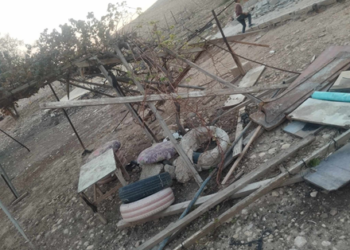
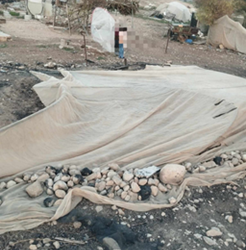 Sheep pen after Israeli settlers’ raid
Sheep pen after Israeli settlers’ raid
The Struggle of the Fuqaha Family: Livelihood Under Siege in Ein al-Beida
The Fuqaha family, led by Ferial Fuqaha, resides in Ein al-Beida in the Jordan Valley, where they depend primarily on raising livestock and sheep for their livelihood. Like many Palestinian families in the region, they practice seasonal displacement to grazing areas, such as Al-Farisiya, to sustain their flocks. However, since October of last year, escalating settler attacks have made this essential practice particularly risky. The pastoral lands they rely on have become sites of violence and destruction, threatening not just their livelihood but their very existence.
The Fuqaha family has faced a series of systematic brutal assaults. Their basic belongings have been stolen, and their sheep pens have been specifically targeted. Two sheep sheds and four solar batteries were stolen, while their water tank was set on fire. Temporary homes, constructed from tin and bricks, were demolished, and old olive trees were cut down. Settlers have also placed dead sheep into the family’s pen, endangering the health of their 150 sheep, many of which have since fallen ill. The family estimates the damage to their livestock and property exceeds $10,000. In another devastating blow, settlers destroyed 35 beehives, stealing some and shattering others, causing additional losses estimated at over $15,000. These relentless attacks are a calculated effort to sever the family’s connection to their land, making their livelihood unsustainable and pushing them towards displacement. Given that the Jordan Valley is classified as Area C where Palestinian construction and rebuilding are prohibited, recovering from these attacks becomes nearly impossible.
The Fuqaha family’s troubles exemplifies the broader struggle of Palestinian families in the Jordan Valley, who face the constant threat of settler violence and the systematic obliteration of their means to survive.
Ferial Fuqaha and her family have been cut off from their primary source of livelihood, their sheep pen, due to the dangerously annoying presence of settlers in the area. This forced restriction has left the herd isolated from essential grass and water sources, leading to deteriorating sheep health, increased vulnerability to disease, and rising costs of closed system breeding, which the family can no longer afford. As a result, their entire herd faces the threat of extinction. These mounting losses jeopardize the family’s food security and push them dangerously close to poverty.
The anguish of this situation has driven Mrs. Ferial to despair, as she considers abandoning her land to escape the ongoing suffering. She grievously testify: “By God, they have deprived us of our livelihood. We no longer know what to do. The sheep are getting sick and dying, and the land has become a prison. We cannot live like this. We want to leave here.”
The Fuqaha family’s struggle is characterize of the broader reality for thousands of Palestinians living in the Jordan Valley and the West Bank. These systematic attacks on livelihoods are not isolated incidents of violence; they reflect a calculated policy designed to displace residents and dismantle their means of survival. Since the year 2000, nearly ten families have already been forced to migrate from the community in search of better opportunities and alternative incomes, representing a distinct violation of international humanitarian and human rights laws.
Overall, these violations threaten a new wave of mass displacement in the Palestinian territories, diminishing any prospects for peace and stability in the region. The impact of these practices is felt across all segments of society, with women and children bearing the effect. In this community of approximately 3,000 people, over 70% are women, 25% are children, and many young adults are now choosing to leave rather than build their lives in an environment where livelihoods are scarce and survival is uncertain.
About the Village of Ein al-Beida
Ein al-Beida is a Palestinian village situated 15 kilometers northeast of Tubas Governorate, separated by the permanent Tayasir checkpoint. The establishment of the Mahola settlement, which was built on confiscated territory, has significantly affected the village’s lands. Geographically, Ein al-Beida is bordered to the north by the Beisan area and the Green Line (the 1949 Armistice Line), to the south by the Wadi al-Maleh region, to the east by the Jordan River, and to the west by the village of Bardala and the Jabaris Mountains.
Currently, Ein al-Beida has a population of approximately 3,000 people. The village’s residential area covers 620 dunums according to its official master plan. Its lands are designated as Areas B and C, with no portion classified as Area A.
**************************************************************
Prepared as part of the project:
“Mapping and Diagnosing Palestinian Rural Women’s Livelihood and Economic Empowerment in Area “C”.
Implemented by: The Applied research Institute-Jerusalem (ARIJ)
Prepared by:
The Applied Research Institute – Jerusalem


